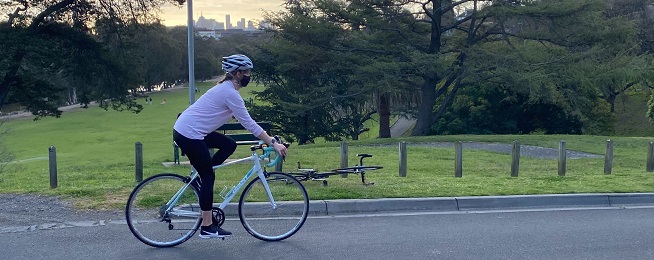COVID-19 was generally positive for inner Melbourne’s bike commuters with riders feeling better about riding to work and doing it more frequently, a research report has found.
The positive attitude resulted from three key factors: minimal risk of infection when riding; less traffic; and new additional bike infrastructure.
The case study involved quantitative and qualitative findings from both an online survey and individual semi-structured interviews.
It was undertaken by Melbourne University student Sarah Gigante, a champion bike racer, Olympic competitor, Australian National Champion and a member of UCI World Tour team Movistar.
It has been previously reported that recreational riding in Melbourne lifted appreciably during the COVID, especially during lockdowns. There was an associated spike in bike sales.
The key research question in this paper was “to what extent have commuters’ attitudes towards, and use of, cycling as a form of commuting in inner Melbourne changed as a result of the COVID-19 pandemic?”
The paper reports that 83% of survey participants cited the minimal risk of viral infection as an attraction to cycle commuting arising from the pandemic.
Interviewees mentioned the opportunity for social distancing as motivation for cycle commuting, commonly alongside a continued COVID-related dislike of public transport, notably still a factor two years after lockdowns.
The paper reports "75% of survey participants indicated that the decreased traffic during lockdowns made cycle commuting more attractive due to increased safety.
"It was also mentioned as a key motivator to increase cycling by all five interviewees, in statements such as 'roads were for bikes' and 'minimal cars made me feel a lot safer’”.
"Although traffic levels rebounded, some participants kept cycle confidence that had initially been gained from those periods.
"This included one interviewee, a new cyclist, who explained that 'when the cars came back, I knew how to get through the intersections that had always bothered me.”
New bike infrastructure cited by 59% of survey participants as a drawcard.
"Disruptions to an established routine and an increased awareness to physical and mental health benefits were other motivators commonly mentioned in both the survey and interviews, largely due to an awareness of decreased exercise during lockdowns.”
Respondents reported that they would commute by bike more if the network of bike routes was further improved, with better connectivity, better separation from cars, and greater lane width.
You can read Sarah Gigante's research report here.
Become our friend
Find out more about Bicycle Network and support us in making it easier for people to ride bikes.


